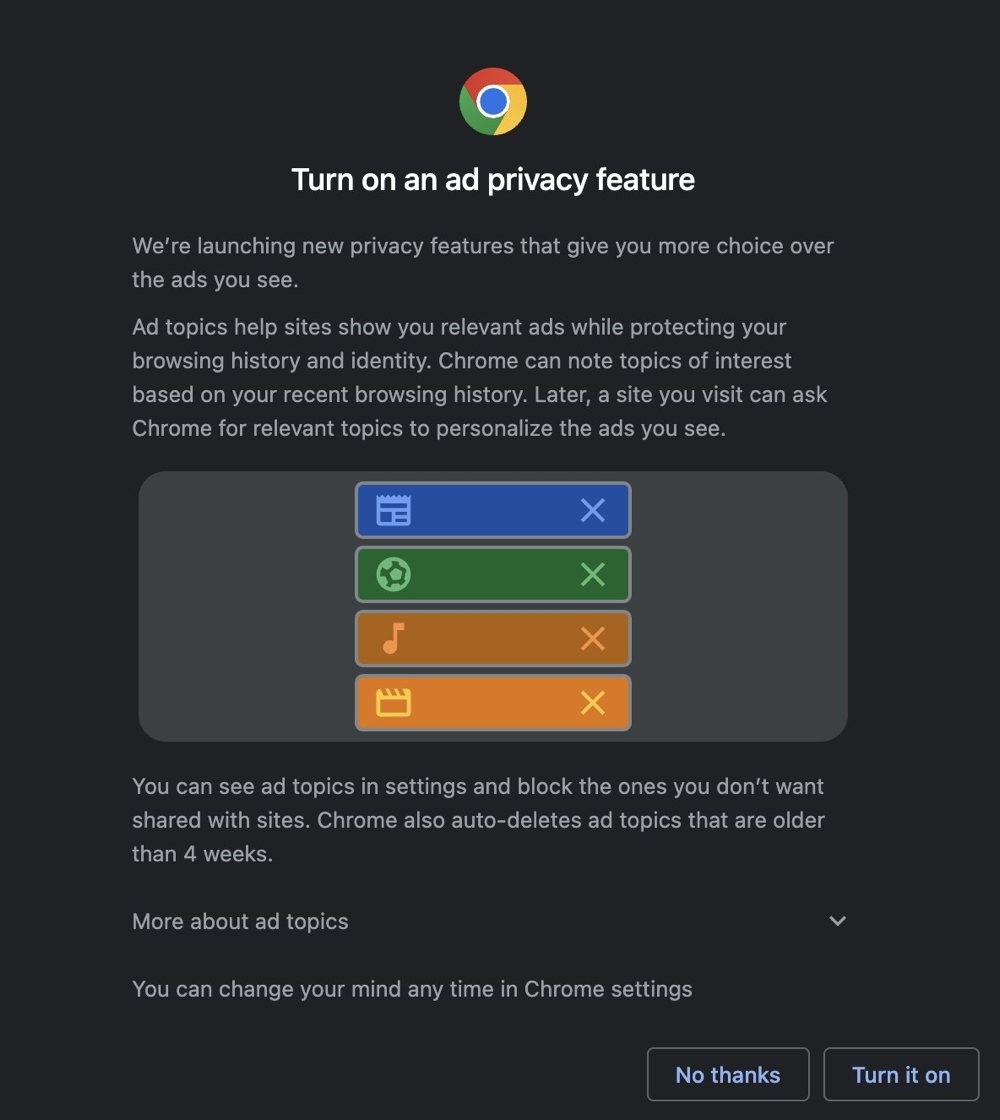SEARCH
Google launches its "Privacy Sandbox" and turns on interest-based advertising

SHARE IT
Don't allow Chrome's major redesign distract you from the fact that Chrome's intrusive new ad platform, dubbed the "Privacy Sandbox," is also becoming more widely available in Chrome today. If you haven't been following along, this function tracks the online pages you visit and generates a list of advertising subjects that it shares with web pages whenever they ask, and it's incorporated right into the Chrome browser. It was originally known as "FLoC" and then the "Topics API," and despite significant resistance from nearly every non-advertiser on the planet, Google controls Chrome and is one of the world's largest advertising corporations, therefore this is being railroaded into production builds.
Google appears to be aware that this will not be popular. Unlike the redesign's glamorous front-page Google blog article, the significant ad platform launch announcement is buried away on the privacysandbox.com website. According to the blog post, the ad platform has reached "general availability," which means it is now available to the majority of Chrome users. The APIs were released about a month ago, and there have been a million incremental steps in the beta and dev releases, but the job is now done.
When users use Chrome, they should see a pop-up telling them that a "ad privacy" option has been put out and activated. Users have been seeing the new pop-up all week. As you can see in the pop-up, all of Google's documentation on this feature appears to have been produced on the same day, with Google describing the browser-based advertising platform as "a significant step on the path towards a fundamentally more private web."
The argument here is that Google pledges to turn off third-party monitoring cookies in Chrome someday—not now, but someday—and that the new ad platform, which has some constraints, is preferable to the free-for-all that is third-party cookies. The problem is that third-party cookies mostly impact Chrome users. Apple and Firefox have both blocked third-party cookies for years and will not be using Google's new advertising scheme, leaving only the Chromium browsers to do so.

That was the catalyst for the entire process: When Apple disabled third-party cookies in Safari in 2020, it inflicted a massive hit to Google's key income stream. While it was a victory for privacy, Google will not follow suit until its advertising business is safe. The Federated Learning of Cohorts and now the Topics API are part of a strategy to offer a "alternative" monitoring platform, and Google believes that there needs to be an alternative tracking platform—you can't just not be spied on. The Electronic Frontier Foundation stated the same thing when it termed Google's FLoC a "terrible idea," claiming that "[Google's] framing is based on the false premise that we have to choose between 'old tracking' and 'new tracking.'" It's not an either-or situation.
There are currently some controls for this included into Chrome. You can also enter "chrome://settings/adPrivacy" into the address bar. Just go to Chrome Settings, then "Privacy and Security," then "Ad privacy." From there, you can click through to each of the three separate pages and deselect the top option, which should enable you to disable the ad platform in only six clicks. You can check out the "Ad topics" page, where Google will display the advertisements Chrome believes you'd be interested in seeing, if you leave it on for a long. When you visit a page, this list is transmitted to the website's advertisers.
In the second half of 2024, according to Google, it will begin to ban third-party cookies—presumably after ensuring that the "Privacy Sandbox" will enable it to maintain its financial viability. Did anyone desire a user-tracking and advertising platform built right into their browser? Most likely not, but considering that Google controls Chrome, this still isn't likely to convince anyone to move to Firefox.
MORE NEWS FOR YOU

 Help & Support
Help & Support 

